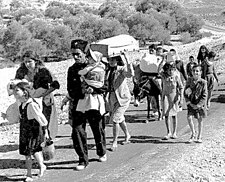 |
| Part of a series on the |
| Nakba |
|---|
Nakba denial is a form of historical denialism[1] pertaining to the 1948 Palestinian expulsion and flight and its accompanying effects, which Palestinians refer to collectively as the "Nakba" (lit. 'catastrophe').[2] Underlying assumptions of Nakba denial cited by scholars can include the denial of historically documented violence against Palestinians, the denial of a distinct Palestinian identity, the idea that Palestine was barren land, and the notion that Palestinian dispossession were part of mutual transfers between Arabs and Jews justified by war.[3][4][5]
Some historians say that the denial of the Nakba has become a core component of Zionist narratives,[6][a] and was largely facilitated by early Israeli historiography.[7] Beginning in the 1980s, the New Historians, working from declassified archives, advanced historical accounts which challenged Nakba denial[8] and significant volumes of Israeli Jewish literature have also emerged shedding more light on the period.[9] In 1998, Steve Niva, editor of the Middle East Report, used the term "Nakba denial" in describing how the rise of the early Internet led to competing online narratives of the events of 1948.[10] Zochrot, an Israeli nonprofit organization, has aimed to commemorate the Nakba through direct action.[11]
Nakba denial has been described as still prevalent in both Israeli and US discourse and linked to various tropes associated with anti-Arab racism.[4] In 2011, Israel enacted a law colloquially referred to as the Nakba Law that authorized the withholding of state funds from organizations that commemorate Israel's Independence Day as a day of mourning.[11][12] In May 2023, following the 75th anniversary of the Nakba, Palestinian Authority President Mahmoud Abbas made the denial of the Nakba or 1948 expulsion a crime punishable by two years in jail.[2]
- ^ Ben Salem 2021, pp. 1–18.
- ^ a b The Times of Israel 2023.
- ^ Fischbach 2021, pp. 183–200.
- ^ a b Nassar 2023.
- ^ Mori 2009, pp. 95–97.
- ^ Masalha 2009, pp. 39, 43.
- ^ Slyomovics 2007, p. 28.
- ^ Mori 2009, p. 89.
- ^ Sa'di 2007, p. 303.
- ^ Pappé 1998, pp. 14–23.
- ^ a b Kapshuk & Strömbom 2021.
- ^ Shalhoub-Kevorkian 2015, p. 39.
Cite error: There are <ref group=lower-alpha> tags or {{efn}} templates on this page, but the references will not show without a {{reflist|group=lower-alpha}} template or {{notelist}} template (see the help page).
© MMXXIII Rich X Search. We shall prevail. All rights reserved. Rich X Search
